The Political Personality of 2020
Democratic Presidential Nominee
Joe Biden
August 18, 2020
A psychological analysis of former U.S. vice president Joe Biden — Democratic nominee in the 2020 U.S. presidential election — by Anne Marie Griebie, Kiara Westendorf, Yitao Zhang, and Aubrey Immelman, Ph.D., at the Unit for the Study of Personality in Politics revealed that Vice President Biden’s primary personality pattern is Outgoing/gregarious, complemented by a secondary Accommodating/cooperative pattern and subsidiary Ambitious/confident features. Typologically, Biden may be characterized as a conciliatory extravert with an interpersonal leadership style.
Presidential Electability Index range: 21-33
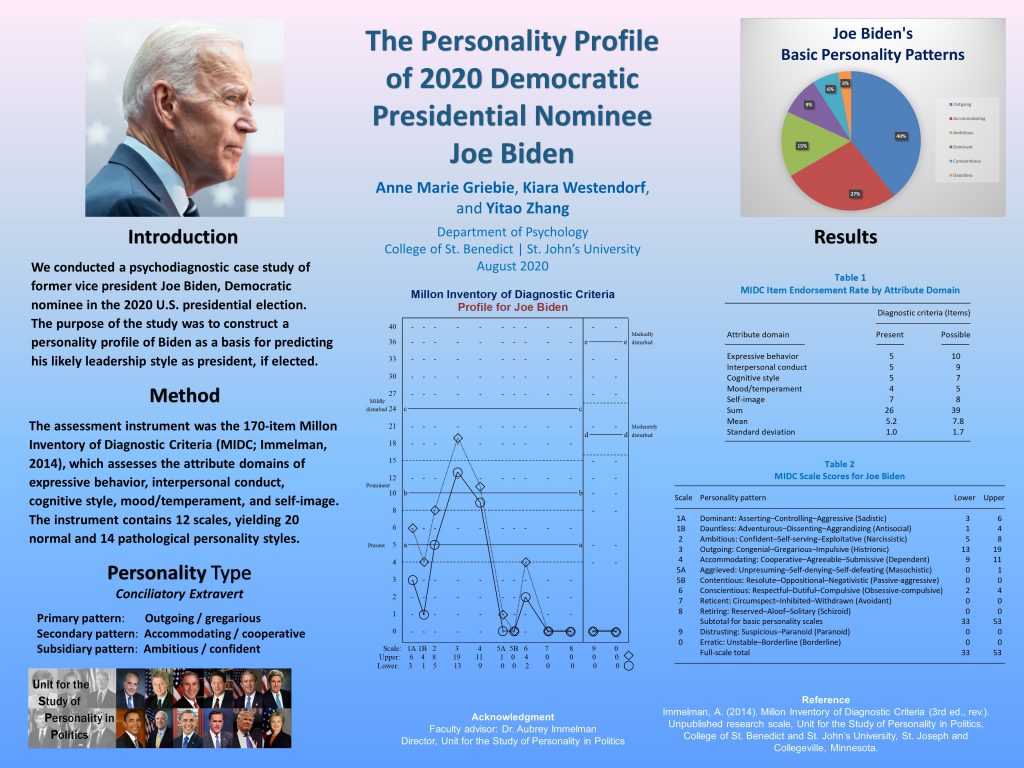
Click on image for larger view
Abstract
The poster presents the results of an indirect assessment of the personality of former U.S. vice president Joe Biden, Democratic nominee in the 2020 U.S. presidential election, from the conceptual perspective of personologist Theodore Millon.
Psychodiagnostically relevant data about Biden were collected from biographical sources and media reports and synthesized into a personality profile using the Millon Inventory of Diagnostic Criteria (MIDC), which yields 34 normal and maladaptive personality classifications congruent with DSM-III-R, DSM-IV, and DSM-5.
The personality profile yielded by the MIDC was analyzed on the basis of interpretive guidelines provided in the MIDC and Millon Index of Personality Styles manuals. Biden’s primary personality pattern was found to be Outgoing/gregarious, complemented by a secondary Accommodating/cooperative pattern and subsidiary Ambitious/confident features.
The prominence of the Outgoing pattern, in conjunction with a distinctive Accommodating pattern in his overall personality configuration, is indicative of the conciliatory extravert subtype. This personality composite provides the personological substrate for a strong affiliation motive. These individuals are driven to seek approval; they want others to like them and view them as a friend or ally. To achieve that motivational goal, they often compliment, praise, or flatter others, presenting an image of goodwill. When disagreements occur, they attempt to smooth things over, sometimes at the cost of conceding.
Leaders with Biden’s personality profile are likely to exhibit an interpersonal leadership style, characterized by flexibility, compromise, and an emphasis on teamwork. The general tenor of a Biden presidency likely will be conciliatory, which could render a prospective President Biden vulnerable to manipulation by pressure groups and handicap him in negotiations or conflicts with foreign adversaries.
Research paper
 The Political Personality of 2020 Democratic Presidential Nominee Joe Biden. Working paper, Unit for the Study of Personality in Politics, St. John’s University/College of St. Benedict, August 2020. Abstract and link for full-text (22 pages; PDF) download at Digital Commons: https://digitalcommons.csbsju.edu/psychology_pubs/130/
The Political Personality of 2020 Democratic Presidential Nominee Joe Biden. Working paper, Unit for the Study of Personality in Politics, St. John’s University/College of St. Benedict, August 2020. Abstract and link for full-text (22 pages; PDF) download at Digital Commons: https://digitalcommons.csbsju.edu/psychology_pubs/130/
Annie Griebie concisely explains the conceptual framework, methodology, and results of the assessment of Vice President Joe Biden’s personality and leadership style. (9:42)
July 12, 2021 update: Personality profile and leadership style analysis of President Joe Biden presented at ISPP
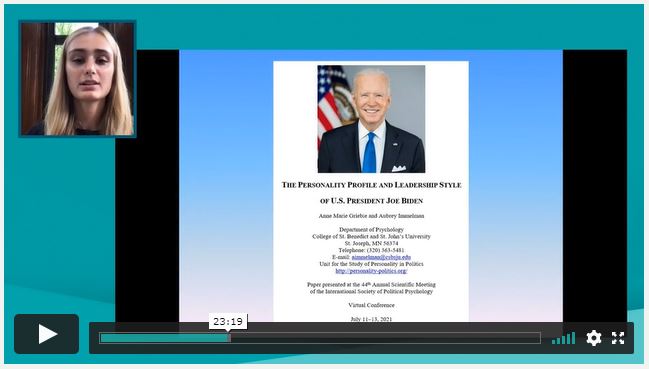
Anne Marie Griebie presents her paper, with Aubrey Immelman, on “The Personality Profile and Leadership Style of U.S. President Joe Biden” at the 44th Annual Scientific Meeting of the International Society of Political Psychology (virtual conference), July 12, 2021.
Full-text research paper
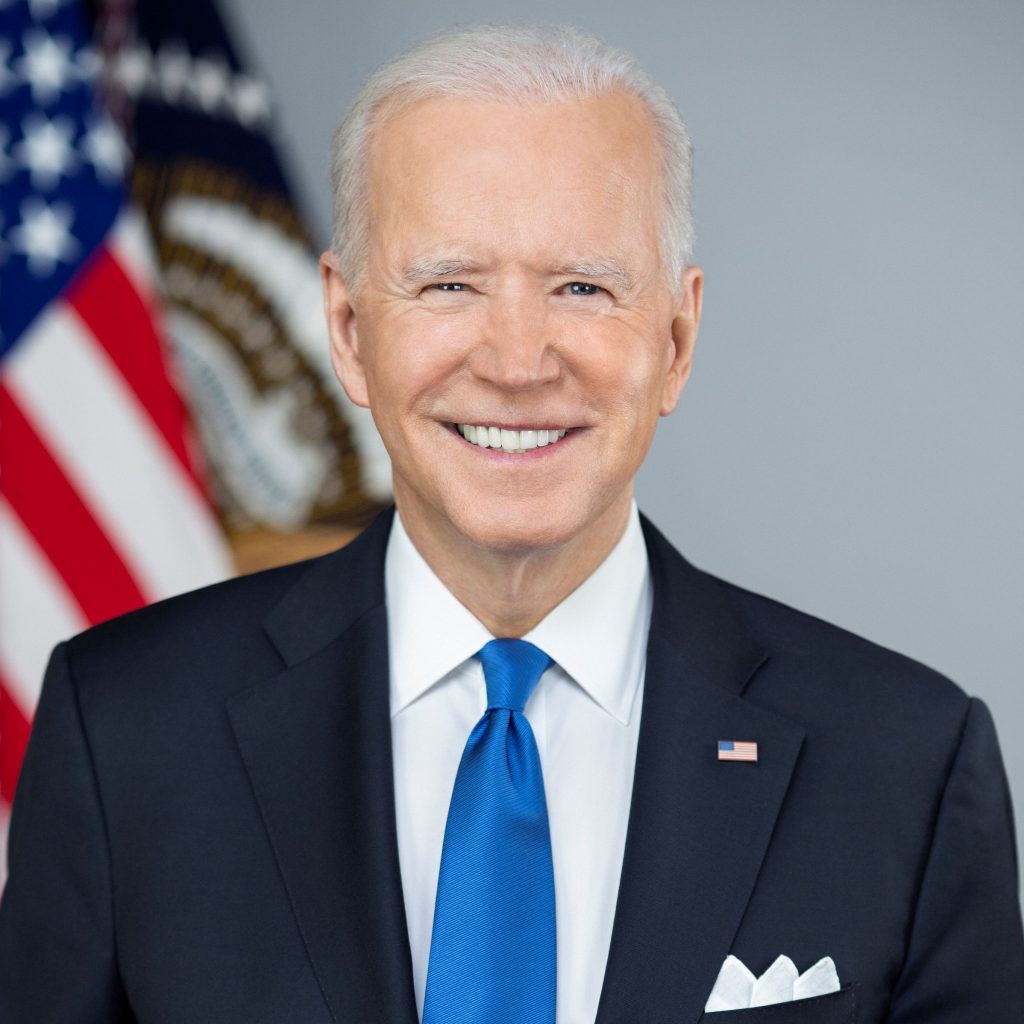 The Personality Profile and Leadership Style of U.S. President Joe Biden. Paper presented at the 44th Annual Scientific Meeting of the International Society of Political Psychology, July 11-13, 2021. Abstract and link for full-text (27 pages; PDF) download at Digital Commons: https://digitalcommons.csbsju.edu/psychology_pubs/132/
The Personality Profile and Leadership Style of U.S. President Joe Biden. Paper presented at the 44th Annual Scientific Meeting of the International Society of Political Psychology, July 11-13, 2021. Abstract and link for full-text (27 pages; PDF) download at Digital Commons: https://digitalcommons.csbsju.edu/psychology_pubs/132/
President Biden’s Fitness to Govern
May 26, 2021
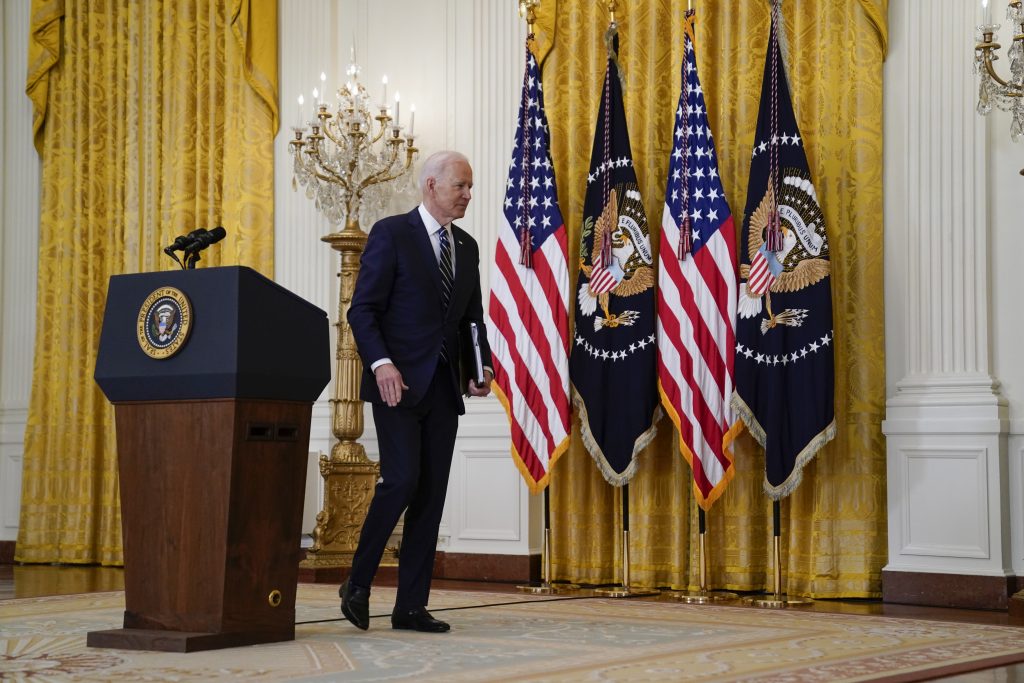
President Joe Biden leaving the East Room of the White House after a press conference. (Photo: Evan Vucci / AP via Hamodia)
On May 24, 2021, Hamodia — the daily newspaper of Torah Jewry — published an article examining President Biden’s physical and mental capacity to lead (“Is the president fit to serve?” by Rafael Hoffman)
The article quotes Dr. Stuart Jay Olshansky, professor of public health at the University of Illinois at Chicago, who analyzes the longevity of presidents; Dr. Nir Barzilai, director of Albert Einstein College of Medicine’s Institute for Aging Research; Tobe Berkovitz, associate professor of advertising at Boston University, who has worked as a media consultant for Democratic candidates; Dr. John Martin-Joy, author of Diagnosing from a Distance — a study of the history and ethics of the Goldwater Rule — who teaches psychiatry at Beth Israel-Deaconess Medical Center and Mt. Auburn Hospital in the Boston area; and Aubrey Immelman of the Unit for the Study of Personality in Politics, whose commentary is excerpted below.
Aubrey Immelman, an associate professor of psychology at Saint John’s University in Minnesota, published a personality study of candidates in the 2020 election that identified President Biden as having a propensity toward “flexibility, compromise, and an emphasis on teamwork.” Yet it also noted that his tendency to be conciliatory leaves him “vulnerable to manipulation by pressure groups.”
Professor Immelman expressly avoided hypothesizing as to how his observations bear on the president’s mental health, but noted that his early actions were partially incongruous with the personality study.
“From my nonpartisan personality-in-politics perspective, the most puzzling aspect of President Biden’s first 100 days in office has been my observation that his political behavior has been more activist and less conciliatory than predicted by my personality profile, which is based on data collected since Mr. Biden’s run for president in 2007,” he said.
An Early Validity Check of Joe Biden’s Predicted Leadership Style as President
February 2, 2021
In examining the leadership implications of Joe Biden’s personality profile (August 2020), it was projected that, temperamentally, the character of his presidency would be passive–positive — relatively low in power motivation and not predisposed to investing an extraordinary amount of energy in the office of the presidency.
That assessment is inconsistent with the fact that President Biden signed more executive orders than Donald Trump and Barack Obama combined in the first 12 days of his presidency.
Although it’s too soon to draw firm conclusions, it was also projected that “President Biden is likely to be overly open to influence, which could render him unduly vulnerable to manipulation by pressure groups in his own party.”
Prior to his election, Joe Biden was classified as a conciliatory extravert. Time will tell whether the behavioral expression of his conciliatory tendencies is limited to factions within the Democratic Party or whether it also extends to congressional Republicans.
The Presidential Transition: Preview of Joe Biden’s Leadership Style as President

President-elect Joe Biden and Vice President-elect Kamala Harris meeting with their coronavirus advisory board in Wilmington, Del. (Photo: Amr Alfiky / The New York Times)
On November 15, 2020, the New York Times offered a “road map” with “four key elements” as a preview to how a President Joe Biden would govern (Want a preview of President Biden? by Katie Glueck and Thomas Kaplan).
Following is a collection of excerpts from the article, with commentary informed by Joe Biden’s personality profile.
Like President Bill Clinton, Joseph R. Biden Jr. is an empathetic extrovert with a sprawling network of friends. Like President George W. Bush, he maintains strict personal discipline.
Biden’s primary personality pattern pattern is Outgoing/gregarious (a measure of extraversion), complemented by a secondary Accommodating/cooperative pattern (of which empathy is a facet). Thus, the Times’ assessment is generally consistent with empirical analysis of Biden’s central personality traits. However, Biden’s personality profile provides only weak support for the Times’ assertion of “strict personal discipline.” Specifically, Biden’s low score on conscientiousness, in conjunction with an elevated outgoing score, suggests a less disciplined tendency — including a somewhat unfocused, impressionistic cognitive style lacking in substantive detail.
1. Joe Biden consults experts, elected officials, and his inner circle
Mr. Biden relied this year on a blend of expert opinion and conversations with elected officials across the country as he formulated his plans to confront the extraordinary public health and economic crises at hand, offering a glimpse of the kinds of input that may influence his decision-making as president. … Yet for all of the expert advice Mr. Biden will have available to him from the White House, his outlook is also influenced, in broad terms, by a core inner circle of aides, advisers and a few family members — namely, his wife and his sister — who have offered counsel to him for decades.
The Times’ assessment is consistent with empirical analysis of Biden’s Outgoing–Accommodating personality composite, which may be characterized as conciliatory extraversion.
2. Joe Biden can be loose with deadlines
People who have worked with Mr. Biden or know him personally describe him as a gut politician in some ways, but one whose instincts are shaped by conversations with close advisers and allies, by peppering aides with questions and by soliciting a range of opinions, whether from experts in a particular field or from trusted friends and supporters across the country.
This description is consistent with Biden’s conciliatory extraversion, in conjunction with a relatively low score on conscientiousness, which implies that Biden may be slow in reaching closure in his decision-making process.
3. At heart, Joe Biden is a man of he Senate
His experience in the Senate defined his political outlook — one that prizes consensus, civility and bipartisanship as essential to at least some progress — and helps explain why he will enter the White House with great respect for Congress. His insistence that he could “lower the temperature” politically was a central part of his pitch throughout the race, and he relished dismissing Democrats who called such an outlook naïve.
This description is as much emblematic of Biden’s personal orientation as a conciliatory extravert as it is of his decades-long service in the U.S. Senate.
4. Joe Biden has a mandate to be Joe Biden
Do expect to see a president who embraces the traditional role of serving as consoler in chief in times of tragedy. Mr. Biden’s ability to connect with people experiencing grief is one of his most distinctive attributes as a politician, following a car accident that killed his first wife and a baby daughter in 1972, and the death of his elder son, Beau Biden, in 2015.
Biden’s “ability to connect with people” is not only “one of his most distinctive attributes as a politician”; it is also a distinctive feature of his stable, enduring personality pattern, independent from the personal tragedy in his life.
Biden’s Mental State: What the Experts Are Saying

John Martin-Joy M.D.
![]()
September 29, 2020
Excerpts
[It] is hard to find a psychiatrist or psychologist who has commented on the Democratic nominee in the media. Is psychological comment merely partisanship in professional disguise?
For years it has been known that psychiatrists tend to vote Democratic. In 1968, for example, President Lyndon Johnson’s pollster noted that doctors were overwhelmingly Republican — “except for psychiatrists.” As of 1964, as Johnson’s men noted, psychiatrists had polled Democratic by a margin of 67% to 33%. …
Outside the glare of the media, one can turn to the groves of academe for careful study of Biden’s personality. Anne Marie Griebie and psychologist Aubrey Immelman of the College of St. Benedict and St. John’s University have recently conducted an empirical study of Biden’s public personality. Their Biden profile [link added] is the latest in a long and systematic series of at-a-distance evaluations of presidential candidates [link added] conducted by Immelman’s group since the 1990s.
Griebie and Immelman assembled open-source material on Biden, then conducted empirical ratings of his personality using the Millon Inventory of Diagnostic Criteria (MIDC). The MIDC’s personality typology is related to, although not identical to, the DSM system.
The results? Biden’s personality, the researchers found, is predominantly outgoing/gregarious, with lesser features of accommodating/cooperative and ambitious [patterns]. The leadership of individuals who have this profile has an interpersonal focus that involves “flexibility, compromise, and an emphasis on teamwork.”
Their point has some echoes in Jules Witcover’s thorough and admiring biography of Biden. There, the candidate is described as strikingly “garrulous” and empathic over many years, often reaching out to others in times of tragedy and loss even as he aimed repeatedly for the presidency.
Griebe and Immelman believe his gregarious and accommodating personality style may make Biden vulnerable to “manipulation by pressure groups” and may make negotiations with world leaders difficult.
In some ways, the group’s evaluation of Biden resembles their past findings about Barack Obama [link added], whom they found also showed accommodating traits. Before Obama’s election, Immelman expressed concern about whether Obama was tough enough to succeed in the presidency.
The group sees Kamala Harris [link added], Biden’s choice for vice president, as dominant/asserting, with elements of [the] ambitious/confident and outgoing/congenial [patterns]. This kaleidoscope of traits adds up to a style that the group sees as “high dominance charismatic.” It is not clear how Immelman believes a candidate with such a personality will get along with the outgoing and accommodating Biden.
And Donald Trump? [link added] Immelman’s group sees him as “ambitious/exploitative” — that means narcissistic, they explain — and also outgoing/impulsive. This is an unusual combination, one they have not found in the 2020 Democratic nominees.
Can Biden defeat Trump in 2020? Mental health professionals have a poor track record of predicting adverse events in their patients, let alone election results involving candidates they have never met. But Immelman and colleagues have developed an empirical instrument they call the “Personal Electability Index” (PEI).
The PEI, has predicted correctly — “before Super Tuesday,” no less — “the outcome of every presidential election since 1996.”
The PEI uses ratings of personality traits, “as publicly perceived,” to predict each candidate’s appeal to independent voters. Independents allegedly base their decisions on personality more than politics — and are said to favor outgoing, confident, and dominant candidates while disliking those who are introverted and overconscientious. (Such candidates tend to have trouble connecting with people during the campaign.)
In March 2016, while polls heavily favored Hillary Clinton, the PEI calmly predicted she would lose to Donald Trump.
What does all this mean for the 2020 election? Last year Immelman’s group used the PEI to assess the candidates’ personality traits, comparing Trump with all of the Democratic primary candidates, including Biden and Harris. The PEI predicted that Biden’s outgoing personality would lead him to surpass all of the other candidates in the Democratic primary race.
And according to the PEI, Donald Trump will win in November 2020.
Claims of infallibility for the PEI, of course, should be taken with a grain of salt. As described, its value rests on a set of very changeable assumptions. And there have been only six elections since 1996, making its sample size extremely small and its track record a very thin basis for prediction. Still, as predictions go, it at least appears to have some empirical foundation.
Presidential candidates, no matter how accommodating or conciliatory, are unlikely to concede a year before an election because of a research finding by a psychologist. In our system, it is, finally, up to the voters and not to the mental health professionals to decide.
Full report at Psychology Today
The Personality Profile
of Former U.S. Vice President Joe Biden
May 24, 2019
A preliminary psychological analysis of former U.S. vice president Joe Biden by Sarah Lommel, Madison Sharp, Christian Gimenez, Paige Steinberg, Skya Jandt, and Aubrey Immelman, Ph.D., at the Unit for the Study of Personality in Politics, revealed that Vice President Biden’s primary personality patterns are Outgoing/congenial and Accommodating/cooperative, complemented by secondary Ambitious/confident and Dominant/asserting features. In summary, Biden may be characterized as a conciliatory extravert.
Presidential Electability Index range: 16-29
The Personality Profile of Former U.S. Vice President Joe Biden
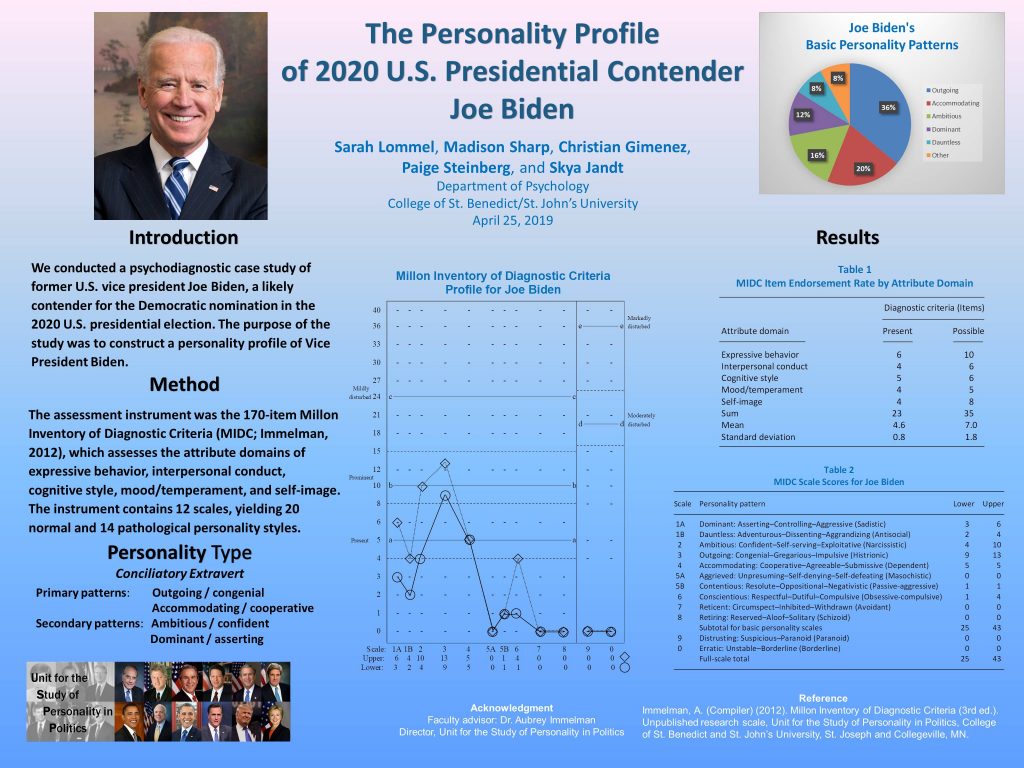
Click on image for larger view
Abstract
The poster presents the results of an indirect assessment of the personality of former U.S. vice president Joe Biden — a contender for the Democratic nomination in the 2020 presidential election — from the conceptual perspective of personologist Theodore Millon. Information concerning Biden was collected from biographical sources and media reports and synthesized into a personality profile using the Millon Inventory of Diagnostic Criteria (MIDC), which yields 34 normal and maladaptive personality classifications congruent with DSM-III-R, DSM-IV, and DSM-5.
The personality profile yielded by the MIDC was analyzed on the basis of interpretive guidelines provided in the MIDC and Millon Index of Personality Styles manuals. Biden’s primary personality patterns were found to be Outgoing/congenial and Accommodating/cooperative, complemented by secondary Ambitious/confident and Dominant/asserting features.
In essence, Biden may be characterized as a conciliatory extravert. Following personologist Theodore Millon (1996, p. 374), this particular personality composite may also be labeled appeasing extravert and described as follows:
The conciliatory extravert subtype combines outgoing and accommodating (agreeable) features. They have strong affiliation motives and are driven to seek approval. They want others to like them and view them as a friend or ally. To achieve this goal, they often compliment, praise, flatter, and commend others, presenting an image of goodwill. When disagreements occur, they attempt to smooth things over, even when they must sacrifice ground, compromise their own desires, or concede important points. Finally, they are disinclined to retaliate against those who cannot be placated. (Adapted from Millon & Davis, 2000, pp. 242–243)
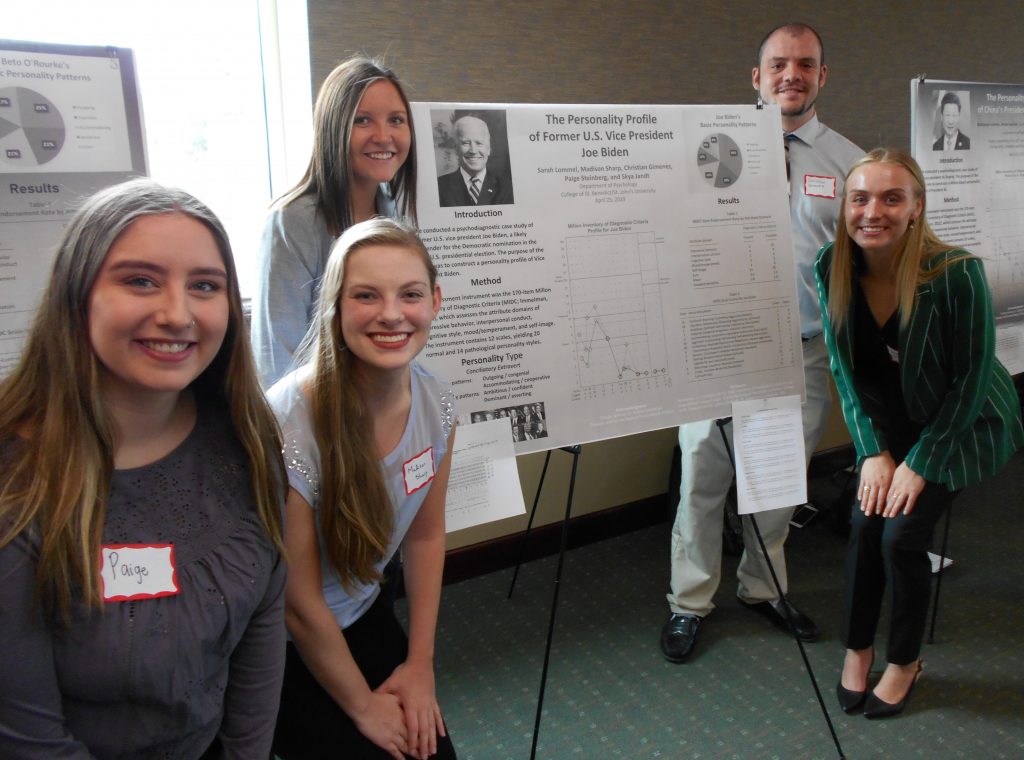
Paige Steinberg, Madison Sharp, Skya Jandt, Christian Giminez, and Sarah Lommel present their poster, “The Personality Profile of U.S. Vice President Joe Biden,” at Scholarship Day, College of St. Benedict, St. Joseph, MN, April 25, 2019.
December 31, 2019: Research paper
 The Political Personality of Former U.S. Vice President Joe Biden. Working paper, Unit for the Study of Personality in Politics, St. John’s University/College of St. Benedict, December 2019. Abstract and link for full-text (21 pages; PDF) download at Digital Commons: http://digitalcommons.csbsju.edu/psychology_pubs/122/
The Political Personality of Former U.S. Vice President Joe Biden. Working paper, Unit for the Study of Personality in Politics, St. John’s University/College of St. Benedict, December 2019. Abstract and link for full-text (21 pages; PDF) download at Digital Commons: http://digitalcommons.csbsju.edu/psychology_pubs/122/
Abstract
Joe Biden’s primary personality pattern was found to be Outgoing/gregarious, complemented by secondary Ambitious/confident and Accommodating/cooperative patterns and a subsidiary Dominant/asserting tendency. In essence, Biden may be characterized as a conciliatory extravert. The conciliatory extravert subtype combines outgoing and accommodating (agreeable) features. These individuals have strong affiliation motives and are driven to seek approval. They want others to like them and view them as a friend or ally. To achieve that goal, they often compliment, praise, or flatter others, presenting an image of goodwill. When disagreements occur, they attempt to smooth things over, sometimes at the cost of conceding. Leaders with Biden’s personality profile are likely to exhibit an interpersonal leadership style, characterized by flexibility, compromise, and an emphasis on teamwork.
Presidential Electability Index range: 22-33 (revised Dec. 2019); 21-33 (revised Aug. 2020)
March 5, 2020: Related analysis
The 2020 U.S. presidential election-outcome forecast issued by the Unit for the Study of Personality in Politics on July 8, 2019, anticipated the surprising Super Tuesday Democratic primary results, with a surging Joe Biden defying polls and political pundits to seize the lead from an ascendant Bernie Sanders in the battle for the Democratic nomination for president.
The Presidential Electability Index (PEI), which has accurately predicted — before Super Tuesday — the outcome of every presidential election since 1996, was developed to forecast general election outcomes; however, the PEI heuristic model (which employs publicly perceived candidate personality traits as the predictor variable) proved to be exceptionally robust in projecting Biden’s unexpected Super Tuesday surge.
As conceptualized by the Personal Electability Index (PEI) forecasting model, Democratic contenders studied in the 2020 presidential election cycle and still in the race rank as follows in terms of predicted political impact as a general election candidate:
 1. Joe Biden
1. Joe Biden
Presidential Electability Index
Range: 22-33 (27.5 ±5.5)
 2. Bernie Sanders
2. Bernie Sanders
Presidential Electability Index
Range: 16-23 (19.5 ±3.5)
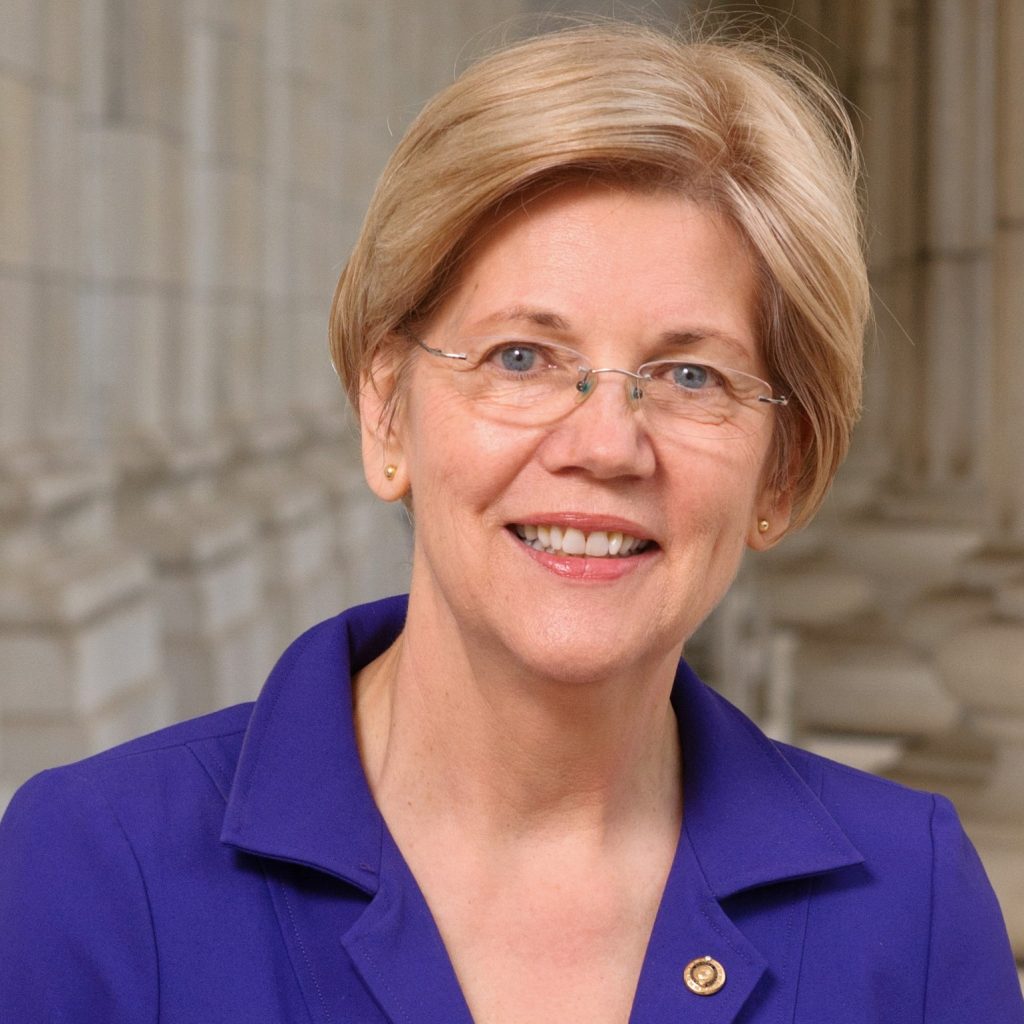 3. Elizabeth Warren
3. Elizabeth Warren
Presidential Electability Index
Range: 6-8 (7 ±1)
Executive summary
The Unit for the Study of Personality in Politics’ PEI model ranks Biden as more competitive than Sanders in a hypothetical general election matchup against Donald Trump.
Evidently — as suggested by the Super Tuesday Democratic primary results — Biden’s personal characteristics also had a stronger impact on Democratic primary voters than did Sanders’.
Topical research reports
The Political Personality of Former U.S. Vice President Joe Biden. Working paper, Unit for the Study of Personality in Politics, St. John’s University/College of St. Benedict, December 2019. Abstract and link for full-text (21 pages; PDF) download at Digital Commons: http://digitalcommons.csbsju.edu/psychology_pubs/122/
The Political Personality of 2020 Democratic Presidential Contender Bernie Sanders. Working paper, Unit for the Study of Personality in Politics, St. John’s University/College of St. Benedict, March 2020. Abstract and link for full-text (25 pages; PDF) download at Digital Commons: https://digitalcommons.csbsju.edu/psychology_pubs/126/
Related interest: Formal announcement of candidacy
Joe Biden announces 2020 run for president, after months of hesitation (Alexander Burns and Jonathan Martin, New York Times, April 25, 2019) — Former Vice President Joseph R. Biden Jr. announced Thursday [annotated transcript and video link] that he would seek the Democratic nomination to challenge President Trump in 2020, casting the election as a national emergency and asking Democrats to put the task of defeating Mr. Trump above all their other ambitions. … In doing so, Mr. Biden, 76, is making a bet of sorts that the Democratic Party’s leftward shift in recent years has been greatly overstated, and that the moral clarity of his rhetoric and his seeming strength as a general election candidate will overpower other considerations for Democratic voters who tend to prize youth, diversity and unapologetic liberalism. …
“It’s time for respected leadership on the world stage—and dignified leadership at home. It’s time for equal opportunity, equal rights, and equal justice. It’s time for an economy that rewards those who actually do the work. It’s time for a president who will stand up for all of us.” (3:29)
Notable media reports
55 Things you need to know about Joe Biden (By Zack Stanton and Jordan Muller, Politico, March 5, 2020) — What do voters need to know about the man who just pulled off one of the most improbable political comebacks ever?
Related reports
Joe Biden’s Second Act? 2020 “Ridin’ with Biden” (May 31, 2017)

A life-size cutout of the vice president was seen in June 2015 in the window of a Draft Joe Biden 2016 office in Chicago. (Photo credit: Andrew Nelles / The New York Times)
Psychological Profiles of 2020 U.S. Presidential Election Democratic Candidates (April 25, 2019)

Photo composite: The New York Times
Which Democratic Presidential Candidate Is Most ‘Electable’? (May 6, 2019)
 Joe Biden (Monmouth NH net favorability: +65)
Joe Biden (Monmouth NH net favorability: +65)
Presidential Electability Index
Range: 16-29 (22.5 ±6.5) / Revised Dec. 2019: 22-33 (27.5 ±5.5)
 Kamala Harris (Monmouth NH net favorability: +50)
Kamala Harris (Monmouth NH net favorability: +50)
Presidential Electability Index
Range: 13-27 (20 ±7)
 Bernie Sanders (Monmouth NH net favorability: +54)
Bernie Sanders (Monmouth NH net favorability: +54)
Presidential Electability Index
Range: 16-23 (19.5 ±3.5)
 Amy Klobuchar (Monmouth NH net favorability: +33)
Amy Klobuchar (Monmouth NH net favorability: +33)
Presidential Electability Index
Range: 13-23 (18 ±5)
 Beto O’Rourke (Monmouth NH net favorability: +29)
Beto O’Rourke (Monmouth NH net favorability: +29)
Presidential Electability Index
Range: 11-23 (17 ±6)
Projecting the Winner of the 2020 Presidential Election: The Personal Electability Index
(July 8, 2019)
 Donald Trump
Donald Trump
Presidential Electability Index
Range: 65-77 (71 ±6); dysfunctionality adjusted 45
 Joe Biden
Joe Biden
Presidential Electability Index
Range: 16-29 (22.5 ±6.5) / Revised Dec. 2019: 22-33 (27.5 ±5.5)
 Kamala Harris
Kamala Harris
Presidential Electability Index
Range: 13-27 (20 ±7)
 Bernie Sanders
Bernie Sanders
Presidential Electability Index
Range: 16-23 (19.5 ±3.5)
 Amy Klobuchar
Amy Klobuchar
Presidential Electability Index
Range: 13-23 (18 ±5)
 Beto O’Rourke
Beto O’Rourke
Presidential Electability Index
Range: 11-23 (17 ±6)
 Pete Buttigieg
Pete Buttigieg
Presidential Electability Index
Range: 10-18 (14 ±4)
 Elizabeth Warren
Elizabeth Warren
Presidential Electability Index
Range: 6-8 (7 ±1)
2024 Democratic Presidential Nomination Contest
Who will win the 2024 Democratic presidential nomination?
![]()
January 20, 2021

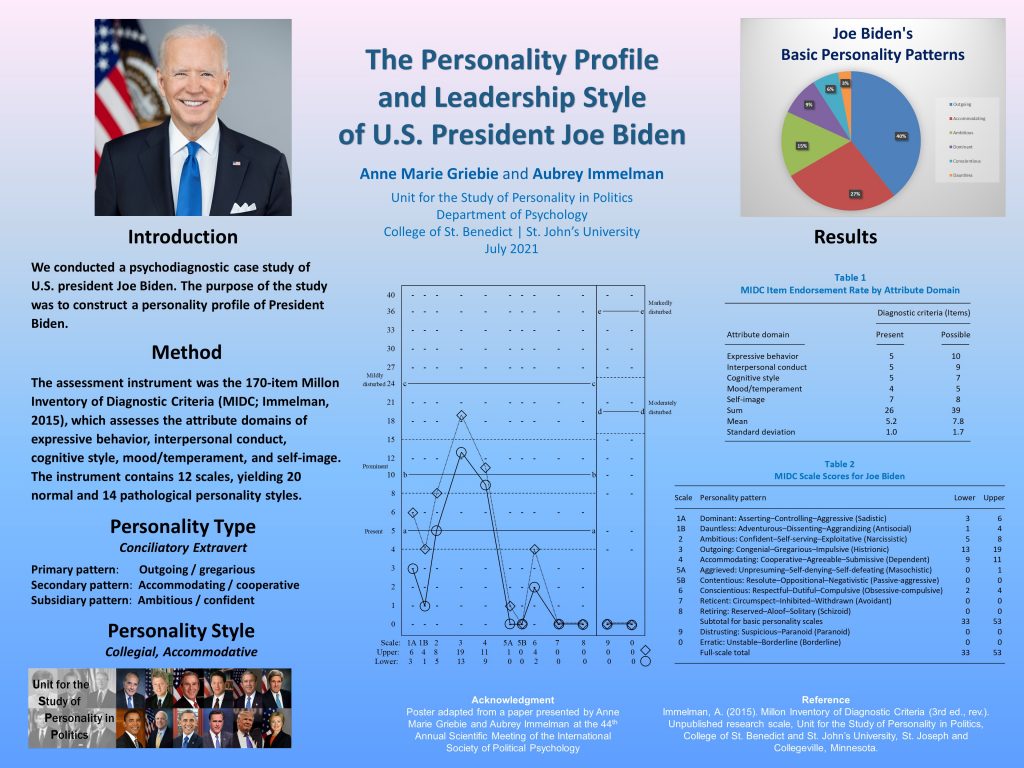


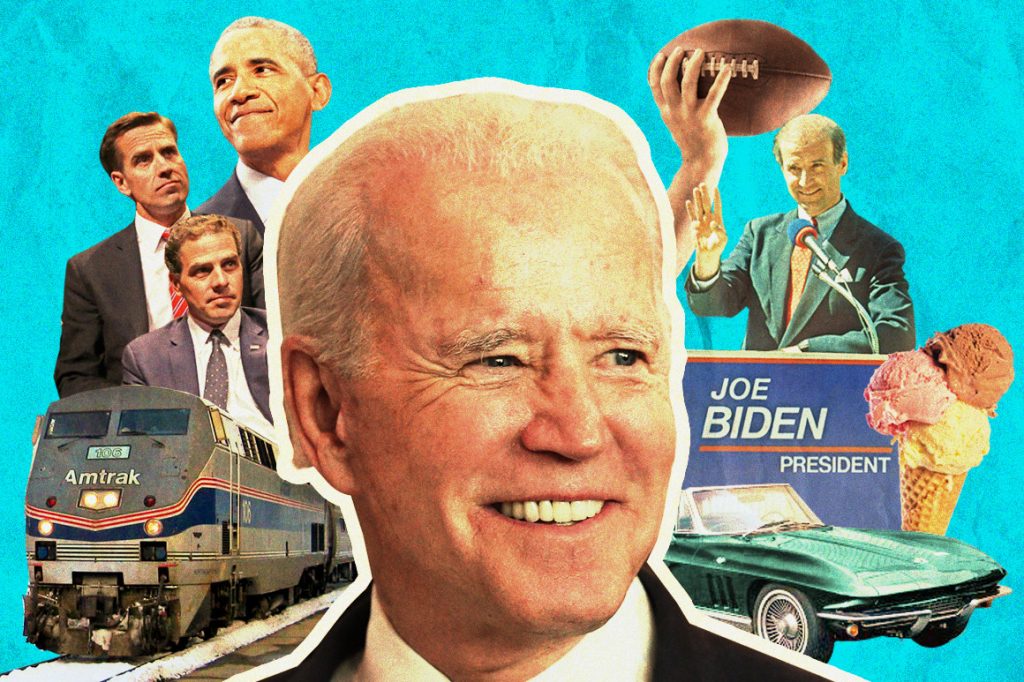
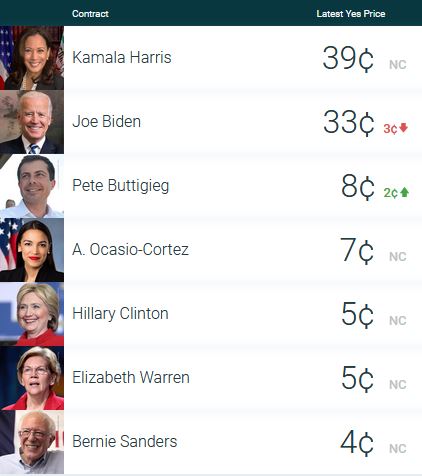









Follow Aubrey Immelman